
|
International Mathematics Competition
|
IMC 2026 |
| Information | Schedule | Problems & Solutions | Results | Contact |
IMC2024: Day 2, Problem 10
Problem 10. We say that a square-free positive integer \(\displaystyle n\) is almost prime if
\(\displaystyle n \mid x^{d_1}+x^{d_2}+...+x^{d_k}-kx \)
for all integers \(\displaystyle x\), where \(\displaystyle 1=d_1<d_2<...<d_k=n\) are all the positive divisors of \(\displaystyle n\). Suppose that \(\displaystyle r\) is a Fermat prime (i.e., it is a prime of the form \(\displaystyle 2^{2^m}+1\) for an integer \(\displaystyle m\geq 0\)), \(\displaystyle p\) is a prime divisor of an almost prime integer \(\displaystyle n\), and \(\displaystyle p\equiv 1\ (\mathrm{mod}\ r)\). Show that, with the above notation, \(\displaystyle d_i\equiv 1\ (\mathrm{mod}\ r)\) for all \(\displaystyle 1\leq i\leq k\).
(An integer \(\displaystyle n\) is called square-free if it is not divisible by \(\displaystyle d^2\) for any integer \(\displaystyle d>1\).)
Tigran Hakobyan, Yerevan State University, Vanadzor, Armenia
© IMC